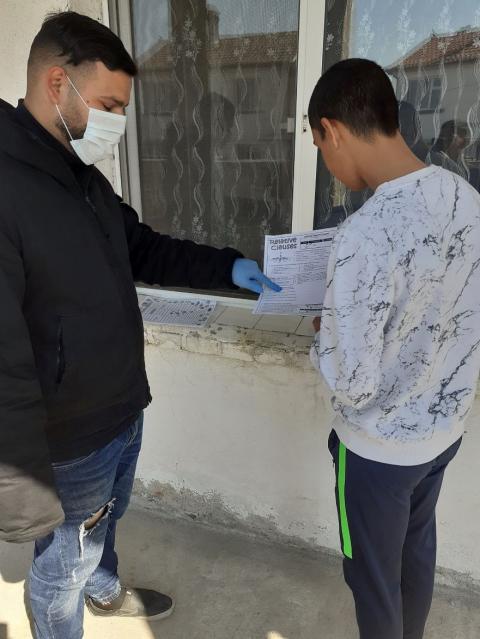Blog: The role of educational mediators during Bulgaria’s state of emergency
By Denitsa Ivanova from Amalipe Centre for Interethnic Dialog and Tolerance (part of the Roma Civil Monitor in Bulgaria). The author describes what it is like for Romani mediators there under the COVID-19 state of emergency in the article that was originally published here on 25 March 2020.
Because of the COVID-19 pandemic, recent days have been hard and difficult for all of us. We have had to dramatically change our daily lives.
Becoming mobilized and responsible is what is now required. We should be grateful to all the doctors, nurses and pharmacists who are in direct contact with the sick and the infected constantly. They really are heroes!
We all have had to give up our regular routines, and that's not easy for anyone. However, teachers have had to radically change their way of working and introduce completely innovative methods. Many are now creating digital lessons for the first time and using different ways of working online with students, and this is not easy at all. They also deserve our thanks.
I also want us to bear in mind another group of people behind the scenes who are just as brave and who risk their lives every day – the hundreds of educational mediators across the country. The truth is that not all children everywhere have the Internet or devices to use it. For these students, no matter how interesting and modern the learning platforms are that are created, they will not be useful without aid in accessing them.
Children from poor families and neighbourhoods, or students with special educational needs, have been visited by educational mediators who bring them paperwork and explain to them how to get into the electronic systems. Some schools have provided masks and protective materials for the mediators, but others have not yet been able to do so. The director of Lyuben Karavelov High School in Varna told us that due to the depleted supplies of masks in the city, mediator Aydin Murshud is visiting students wearing a mask of his own making. This is also the case in the village of Pet Mogili - while gloves and disinfectants are being provided and mediator Silvia Miteva uses them and distributes them to people, there are simply no masks, so she is also protected with by wearing homemade ones. Principals are looking for all kinds of sources for masks but are frustrated by the exhaustion on the market. It is important that these people be urgently supplied.
I would also note that whatever the conditions are, none of the mediators refuses to work. Each is aware of the seriousness of their task and is looking for various ways to help. For example, Boycho Kochev, a mediator in the village of Karadzhovo, Plovdiv district, uses online chats and video calls to track how the children are handling distance learning, to help them with registration, to send them homework and generally mobilize them to be serious.
Many more examples can be given from anywhere in Bulgaria. It is important to note the merit of these people. In addition to helping the children tirelessly, they go around to the houses and talk to the adults, explaining that they should stay home and stay safe. They keep track of the alerts about people returning from abroad and announce them to crisis staffs. They create online campaigns and are in constant contact with children and adults. They calm people and inform them. Their efforts are helping to keep the numbers of those infected from rising dramatically - and let us remind you, they are doing this by risking their lives.
The good thing about hard times is that they remind us of what is most important and teach us to be grateful. May we be thankful today and in the coming difficult days that await us to all those who fight and help.
Let us also be grateful to all tireless educational mediators across the country!
Amalipe Centre for Interethnic Dialog and Tolerance has been involved in the Roma Civil Monitor (RCM) pilot project, and developed and coordinated monitoring reports on the Roma inclusion policy in Bulgaria.
The RCM pilot project is carried out for the European Commission, DG Justice and Consumers. It is coordinated by the Center for Policy Studies of the Central European University (CEU CPS), in partnership with the European Roma Grassroots Organisations Network (ERGO Network), the European Roma Rights Centre (ERRC), the Fundación Secretariado Gitano (FSG) and the Roma Education Fund (REF) and implemented with around 90 NGOs and experts from up to 27 member states.
The opinions expressed in these blog posts are the sole responsibility of the authors and/or their organizations. The CEU Center for Policy Studies is not responsible for any use that may be made of the information or opinions contained herein.




